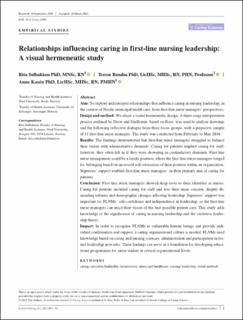| dc.contributor.author | Solbakken, Rita | |
| dc.contributor.author | Bondas, Terese Elisabet | |
| dc.contributor.author | Kasén, Anne | |
| dc.date.accessioned | 2023-02-22T10:31:41Z | |
| dc.date.available | 2023-02-22T10:31:41Z | |
| dc.date.created | 2021-05-11T08:31:27Z | |
| dc.date.issued | 2021 | |
| dc.identifier.citation | Solbakken, R., Bondas, T., & Kasén, A. (2022). Relationships influencing caring in first‐line nursing leadership: A visual hermeneutic study. Scandinavian Journal of Caring Sciences, 36(4), 957-968. | en_US |
| dc.identifier.issn | 0283-9318 | |
| dc.identifier.uri | https://hdl.handle.net/11250/3053149 | |
| dc.description.abstract | Aim
To explore and interpret relationships that influence caring in nursing leadership, in the context of Nordic municipal health care, from first-line nurse managers’ perspectives.
Design and method
We chose a visual hermeneutic design. A three-stage interpretation process outlined by Drew and Guillemin, based on Rose, was used to analyse drawings and the following reflective dialogue from three focus groups, with a purposive sample of 11 first-line nurse managers. The study was conducted from February to May 2018.
Results
The findings demonstrated that first-line nurse managers struggled to balance their vision with administrative demands. Caring for patients implied caring for staff; however, they often felt as if they were drowning in contradictory demands. First-line nurse management could be a lonely position, where the first-line nurse managers longed for belonging based on increased self-awareness of their position within an organisation. Superiors’ support enabled first-line nurse managers’ in their primary aim of caring for patients.
Conclusion
First-line nurse managers showed deep roots to their identities as nurses. Caring for patients included caring for staff and was their main concern, despite demanding reforms and demographic changes affecting leadership. Superiors’ support was important for FLNMs’ self-confidence and independence in leadership, so the first-line nurse managers can enact their vision of the best possible patient care. This study adds knowledge of the significance of caring in nursing leadership and the caritative leadership theory.
Impact
In order to recognise FLNMs as vulnerable human beings and provide individual confirmation and support, a caring organisational culture is needed. FLNMs need knowledge based on caring and nursing sciences, administration and participation in formal leadership networks. These findings can serve as a foundation for developing educational programmes for nurse leaders at several organisational levels. | en_US |
| dc.language.iso | eng | en_US |
| dc.publisher | Wiley | en_US |
| dc.rights | Navngivelse 4.0 Internasjonal | * |
| dc.rights.uri | http://creativecommons.org/licenses/by/4.0/deed.no | * |
| dc.title | Relationships influencing caring in first‐line nursing leadership: A visual hermeneutic study | en_US |
| dc.type | Peer reviewed | en_US |
| dc.type | Journal article | en_US |
| dc.description.version | publishedVersion | en_US |
| dc.rights.holder | The authors | en_US |
| dc.subject.nsi | VDP::Medisinske Fag: 700 | en_US |
| dc.source.pagenumber | 10 | en_US |
| dc.source.journal | Scandinavian Journal of Caring Sciences | en_US |
| dc.identifier.doi | 10.1111/scs.12992 | |
| dc.identifier.cristin | 1909330 | |
| cristin.ispublished | true | |
| cristin.fulltext | original | |
| cristin.qualitycode | 1 | |

